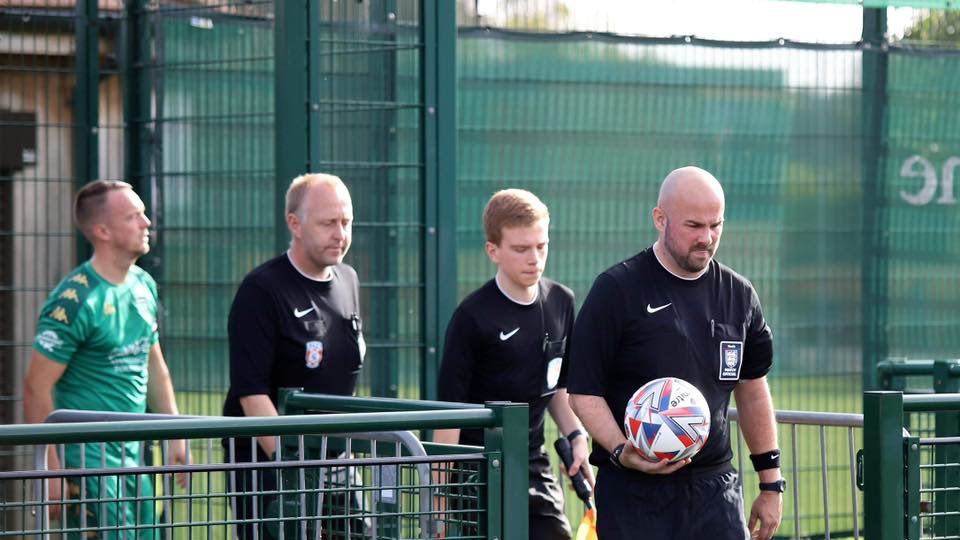This month’s meeting at the Chester Referees’ Association honed in on two important aspects of match control from Law 12: Delaying the Restart of Play and Unsporting Behaviour. Understanding and addressing these actions correctly is key to maintaining the flow and spirit of the game.
Understanding and Differentiating the Terms
Delaying the Restart of Play involves actions intended to slow down the game’s resumption. For example:
- Kicking the Ball Away: When a player deliberately kicks or moves the ball after a free-kick is awarded, it prevents the opposing team from taking a quick restart.
- Standing in Front of the Ball: Players standing too close or blocking the ball to stop a quick free kick.
- Feigning Injury: A player exaggerates an injury to disrupt play and waste time.
- Substitutions: Intentionally walking off the pitch slowly during a substitution, particularly near the end of the match.
- Goalkeeper Time-Wasting: This includes activities such as excessive time taken to retrieve the ball for a goal kick or slow distribution. While it falls under delaying the restart, it can also overlap with unsporting behaviour when done excessively.
Unsporting Behaviour covers actions that go beyond just delaying play and include attempts to gain an unfair advantage. These actions often lack sportsmanship and challenge the referee’s control:
- Goalkeeper Holding the Ball for Too Long: If a goalkeeper holds the ball for more than 6 seconds before releasing it, this is classified as unsporting behaviour rather than delaying the restart. It’s an attempt to waste time and prevent the opposition from restarting play quickly.
- Simulation (Diving): Pretending to be fouled or exaggerating contact to deceive the referee.
- Deliberate Handball to Gain Advantage: Using hands or arms unlawfully to control the ball.
- Foul Play: Any reckless or dangerous tackle or foul that compromises the safety of an opponent.
- Provocation or Taunting: Verbal or physical acts that provoke a reaction from an opponent, possibly inciting further misconduct.
Impact on the Game
Both delaying the restart of play and unsporting behaviour can disrupt the match significantly:
- Disruption of Flow: These actions slow down the game’s tempo and frustrate players and spectators.
- Escalation of Tensions: When unaddressed, they can fuel frustration and lead to conflicts or serious offences.
- Authority of the Referee: Continuous violations undermine the referee’s control, impacting their authority and the respect they command on the pitch.
- Negative Spectator Experience: Fans may react negatively, affecting the atmosphere and integrity of the match.
Strategies for Effective Management
To manage these behaviours effectively, referees can implement the following strategies:
- Immediate Action: Deal with delaying tactics or unsporting actions as soon as they occur to prevent further escalation.
- Clear Instructions: Use clear and assertive communication to let the player know the issue and its consequences.
- Consistency: Apply the rules evenly to maintain fairness and authority.
- Non-Verbal Cues: Use body language and hand signals to reinforce decisions and ensure the player and audience understand your authority.
The Stepped Approach for Refereeing
A structured approach can help manage delaying and unsporting behaviours effectively:
- Quiet Word: Privately address the player and inform them of their actions.
- Involve the Captain: If the behaviour continues, involve the team captain, stressing their role in managing their teammate’s conduct.
- Sanctions: When necessary, apply disciplinary measures. A caution (yellow card) may be issued for continued delaying tactics or unsporting behaviour, and a sending-off (red card) can be considered for more serious offences.
Remember: If the action is severe, you may need to skip steps and proceed straight to a sanction.
Real Match Scenarios and Experiences
Throughout the meeting, referees shared their experiences in handling these situations, highlighting the importance of quick decision-making, clear communication, and understanding the nuances of when an action crosses the line from simply delaying the restart to unsporting behaviour.
For instance, consider a goalkeeper holding onto the ball for over 6 seconds repeatedly in the latter stages of a close match. Though it may initially seem like delaying the restart, this can be considered unsporting behaviour due to the intent to gain an unfair advantage by disrupting the opposition’s chance to attack.
Understanding and enforcing these laws effectively is crucial for maintaining the spirit of the game and ensuring a fair, enjoyable match for all. Make sure to test your knowledge with our quiz and join our discussions to enhance your refereeing skills!

